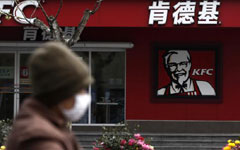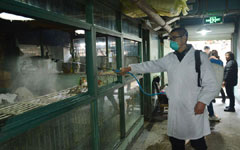GUANGZHOU - The poultry industry in the southern Chinese city of Guangzhou groaned on Friday as live poultry markets were suspended due to the resurgent bird flu epidemic.
Guangzhou, capital of Guangdong province, announced on Friday that all live poultry markets will be closed from February 15 to February 28 to avoid spreading the H7N9 virus.
"Although the closure is only two weeks, it will cause me losses of more than 50,000 yuan ($8,250)," said Tan Qiang, a vendor at Jiangcun market, one of the nation's biggest live-bird markets.
|
 |
|
 |
"The market is closed. We are doomed to suffer and the only thing to do is to clean up," he said.
On Friday, Guangdong reported another death and a new infection. There have been more than 120 human H7N9 cases in China this year, and at least 32 deaths. Guangdong is one of the worst-hit areas.
Trade in Jiangcun market was over 130,000 birds per day in 2012. In 2013, the figure fell to less than half that, but still nearly 60,000 birds a day were loaded on trucks pulling in and out of the market.
Now the market is empty. Only a few vendors remain, cleaning up the trash.
Jiang Yongquan, the market's general manager, said the closure, though only for two weeks, may just be the beginning of a harsh future for the poultry industry.
Lyuhuang Agriculture and Farming Development Co Ltd, a leading poultry company in Guangdong, suffered losses of over 30 million yuan in 2013.
Huang Weilong, CEO of the company, said there are more than 100,000 frozen chickens in storage after the company was forced to slaughter them.
The live poultry industry lost 70 billion yuan during the last bird flu outbreak in April, 2012, and Guangdong was among the worst affected, according to Chen Yingfeng, president of Guangdong Poultry Industry Association.
Over this latest period, the industry is losing more than 1 billion yuan each month, Chen added.
Beijing closed live poultry markets in 2005. The ban is believed to be effective in controlling the virus by blocking the primary source of infection: close contact between humans and poultry.
However, it is important to seek a balance between guarding citizen's safety and the interests of the poultry industry, industry insiders and experts have suggested.
